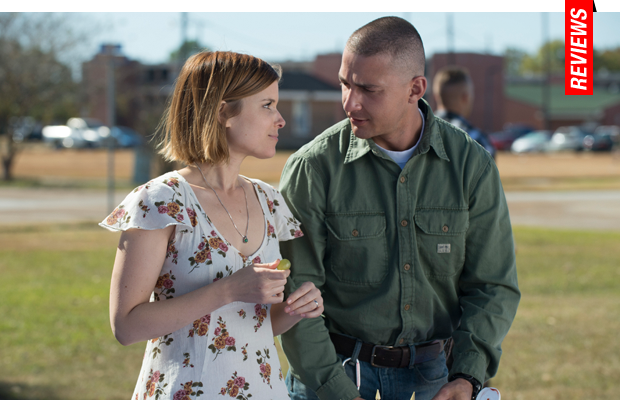Little Drummer Boy: Montiel’s Misguided and Manipulative PTSD Allegory
US Marine Gabriel Drummer’s (Shia LaBeouf) life is shattered following a traumatic incident in Afghanistan. At the same time, conflict in the Middle East seems to have made its way to American’s shores, decimating life as we know it. Struggling to relocate his wife (Kate Mara) and son (Charlie Shotwell) alongside his lifelong best friend and fellow Marine, Devin (Jai Courtney), the narrative is split in three distinct segments, which includes life before deployment and during an extensive psych-evaluation with Captain Peyton (Gary Oldman).
While Montiel is perhaps best known or revered for his 2006 debut, the director continues to allow his subjects to be overwhelmed by awkward visual artifice, elements which play like remnants of what inspired his interest in the first place but should have been excised. If scrappy character asides breaking the fourth wall felt creative in Guide, problematic editing overwhelmed 2011’s The Son of No One (his third title to feature Channing Tatum), while a total lack of interest seemed to plague Direct-to-DVD feature Empire State (2013). Arguably, Montiel’s most interesting (and low-key) character study to date is 2014’s Boulevard, featuring the late Robin Williams as a closeted gay man coming to terms with his sexuality despite the protestations of his wife (a stellar Kathy Baker). Throughout his filmography, Montiel seems determined to capture masculine personas dismantled by their own rudimentary conditioning of what life’s supposed to look like. His latest film premiered in the Horizons sidebar at the 2015 Venice Film Festival, and it is potentially one of his greatest failures because intentions of subversion are continually thwarted by subpar storytelling.
With Man Down, following the jarring, harshly lit opening sequence, Montiel plays with three time periods, the first being the picaresque, Apple-pie glow afforded white, suburban middle class folks who follow each other through familiar life trajectories. Montiel delivers his preferred juxtaposition of male leads, with LaBeouf’s milder mannered lead butted up against an alpha male bestie, with Tatum’s duties this time assigned to Jai Courtney. Their closeness supersedes Drummer’s relationship with his wife (Kate Mara as merely a spousal spectral waif), and Devin’s lack of contact with Natalie in establishing sequences says a lot without saying anything at all. Character actors like Tory Kittles and the great Clifton Collins Jr. show up to portray place markers on the masculinity spectrum, perpetrator and victim on Gabriel’s timeline. Gary Oldman is wasted, a character representative of a gimmicky device whose sequences purposefully withhold or delay information for ultimate emotional impact.
LaBeouf’s characterization is a close cousin to the likes we’ve seen in Andrea Arnold’s American Honey (2016) or David Ayer’s Fury (2014), but his character’s complexities are underlined by the staunch artificiality of the narrative, as well as the visual design. Thus, whatever commendations LaBeouf should or could be afforded disappear into silly ether. DP Shelly Long has the unfortunate task of framing the kookiness of the post-apocalyptic threads with the picket fences mentality of Gabriel’s life before wartime, with middling success.
Man Down, despite a score from Clint Mansell, looks about as distracting and unbelievable as it sounds. What’s unfortunate is how the film’s complex themes, (including a sequence directly referencing the title, which collapses military terminology regarding the maiming of a soldier with a coded expression of affection between men not allowed to display emotion in public), become casualties of the film’s ultimate ineptitude. In many ways this recalls something like Adrian Lyne’s exceptional 1990 post-Vietnam PTSD horror film Jacob’s Ladder, but minus the cerebral depths (some dalliances with Camus, no less) and haunting emotional performances.
★/☆☆☆☆☆
